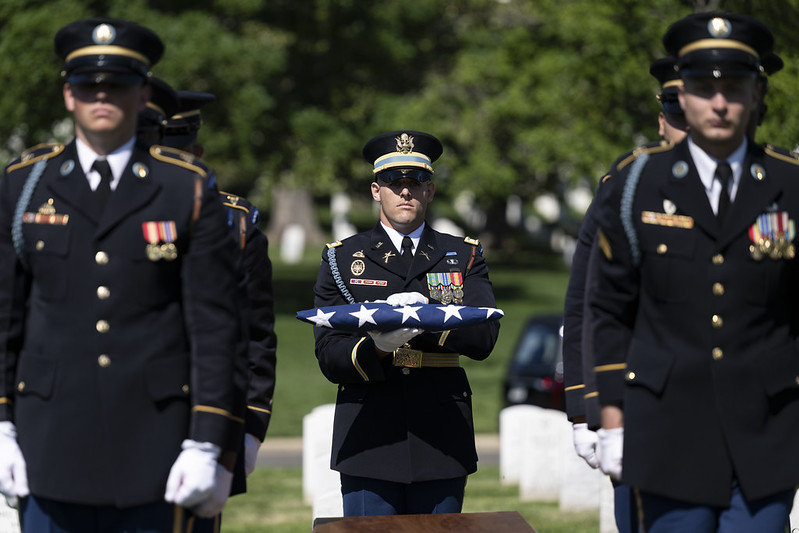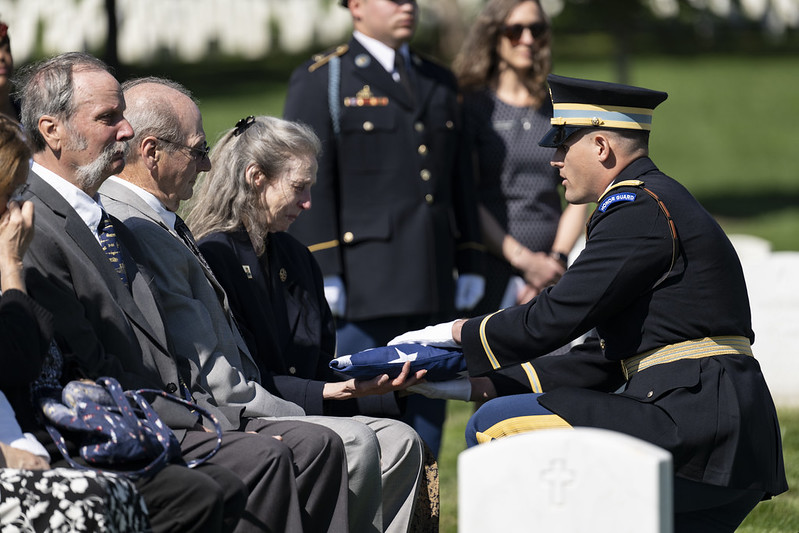
Regina Benson could never understand why people were so fascinated with her World War II service as a U.S. Army nurse. During an interview at the Pentagon on July 10, 2020, at age 100, she asked her daughter, Phyllis Benson, “Why? I didn’t do anything special.” Phyllis simply told her that she was one of the war’s last veterans. “You’ve got to represent.”
But it was more than that. Benson served as an operating room nurse in Hawaii, Okinawa and Hiroshima, Japan. She treated servicemen from all over the Pacific Theater of War in Hawaii. In Okinawa, she set up field hospitals and treated the battlefield wounded. After the war ended, she treated POWs and victims of the atomic bomb that had struck Hiroshima, Japan. “She said they were all horrible burn victims,” Phyllis explained. “That’s all she would say about them.”
 Before shipping out to Okinawa, Regina met Lt. William Benson, a supply officer. The two exchanged letters and William even wrote letters to his superiors, requesting to join her in Japan, but his requests were denied. When the war ended, the two married. He joined the Army Reserves, eventually rising to the rank of lieutenant colonel, while she became a civilian nurse and had three children.
Before shipping out to Okinawa, Regina met Lt. William Benson, a supply officer. The two exchanged letters and William even wrote letters to his superiors, requesting to join her in Japan, but his requests were denied. When the war ended, the two married. He joined the Army Reserves, eventually rising to the rank of lieutenant colonel, while she became a civilian nurse and had three children.
When William died in 1992, Regina had him buried in a New Jersey cemetery, but in 2006, while she was living with Phyllis in northern Virginia, she decided to have his remains moved to Arlington National Cemetery. She joined him there on May 19, 2025, after passing away at the at the age of 105.
At the service, U.S. Army Chaplain (Capt.) Raymond Akeriwe told the gathered family, “Lt. Regina L. Benson faithfully and honorably served her country to include during WWII, where she earned multiple awards and decorations.” He concluded, “In life, she honored the flag,” he said as he gestured at the American flag the honor guard held over the casket, “Now this flag will honor her.”
 Phyllis wore her mother’s Women’s Army Corps lapel pin to the service. She wiped away tears and held her brother Roger’s hand as they stood for the Army rifle team’s firing of three volleys. When Capt. Joe Ryan presented her with the flag that had been draped over her mother’s casket, she held onto it, then looked up at Ryan as he thanked her for her mother’s service. “It was like he was handing me part of my mother,” she later said. “He looked at me with so much respect on his face.” When the service ended, she walked up to her mother’s casket, dropped to her knees and rested her head on the casket.
Phyllis wore her mother’s Women’s Army Corps lapel pin to the service. She wiped away tears and held her brother Roger’s hand as they stood for the Army rifle team’s firing of three volleys. When Capt. Joe Ryan presented her with the flag that had been draped over her mother’s casket, she held onto it, then looked up at Ryan as he thanked her for her mother’s service. “It was like he was handing me part of my mother,” she later said. “He looked at me with so much respect on his face.” When the service ended, she walked up to her mother’s casket, dropped to her knees and rested her head on the casket.
Before the funeral, Phyllis talked about her mother’s service, how she joined because her brothers had enlisted and she thought it was the right thing to do. She also remembered that her mother and two other nurses joined the Army in September of 1944 directly out of nursing school. “They served together throughout the war and remained friends, reuniting yearly until they were in their 90s,” Phyllis said. Finally, she recalled the last and most important thing her mother did for servicemen who did not survive the battlefield. “She wrote home to the families to let them know that their sons didn’t die alone.”
Phyllis also spoke about growing up in a military and nursing household, recalling her mother teaching her to make hospital corners on her bed, playing soldier with her two brothers and receiving promotions with her brothers whenever their father received a promotion. “I have pictures of three kids dressed in khakis saluting,” she explained. Reflecting on later years, when she took in her mother after her father passed away, Phyllis said, “She was my best friend.”
